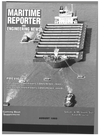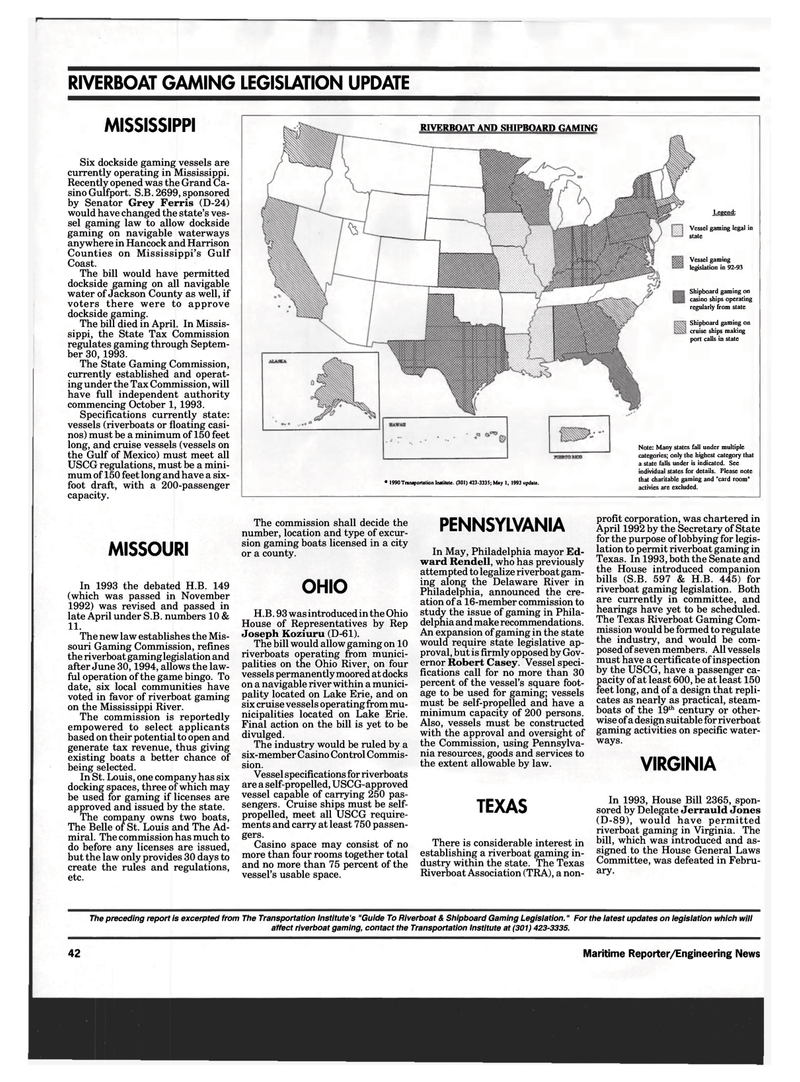
Page 40: of Maritime Reporter Magazine (August 1993)
Read this page in Pdf, Flash or Html5 edition of August 1993 Maritime Reporter Magazine
RIVERBOAT GAMING LEGISLATION UPDATE
RIVERBOAT AND SHIPBOARD GAMING
Legend:
Vessel gaming legal in state
Vessel gaming legislation in 92-93
Shipboard gaming on casino ships operating regularly from state
Shipboard gaming on cruise ships making port calls in state e 1990 Transportation Institute. (301) 423-3335; May 1, 1993 update.
Note: Many states fall under multiple categories; only the highest category that a state falls under is indicated. See individual states for details. Please note that charitable gaming and "card room" activies are excluded.
MISSISSIPPI
Six dockside gaming vessels are currently operating in Mississippi.
Recently opened was the Grand Ca- sino Gulfport. S.B. 2699, sponsored by Senator Grey Ferris (D-24) would have changed the state's ves- sel gaming law to allow dockside gaming on navigable waterways anywhere in Hancock and Harrison
Counties on Mississippi's Gulf
Coast.
The bill would have permitted dockside gaming on all navigable water of Jackson County as well, if voters there were to approve dockside gaming.
The bill died in April. In Missis- sippi, the State Tax Commission regulates gaming through Septem- ber 30,1993.
The State Gaming Commission, currently established and operat- ing under the Tax Commission, will have full independent authority commencing October 1, 1993.
Specifications currently state: vessels (riverboats or floating casi- nos) must be a minimum of 150 feet long, and cruise vessels (vessels on the Gulf of Mexico) must meet all
USCG regulations, must be a mini- mum of 150 feet long and have a six- foot draft, with a 200-passenger capacity.
MISSOURI
In 1993 the debated H.B. 149 (which was passed in November 1992) was revised and passed in late April under S.B. numbers 10 & 11.
The new law establishes the Mis- souri Gaming Commission, refines the riverboat gaming legislation and after June 30,1994, allows the law- ful operation of the game bingo. To date, six local communities have voted in favor of riverboat gaming on the Mississippi River.
The commission is reportedly empowered to select applicants based on their potential to open and generate tax revenue, thus giving existing boats a better chance of being selected.
In St. Louis, one company has six docking spaces, three of which may be used for gaming if licenses are approved and issued by the state.
The company owns two boats,
The Belle of St. Louis and The Ad- miral. The commission has much to do before any licenses are issued, but the law only provides 30 days to create the rules and regulations, etc.
The commission shall decide the number, location and type of excur- sion gaming boats licensed in a city or a county.
OHIO
H.B. 93 was introduced in the Ohio
House of Representatives by Rep
Joseph Koziuru (D-61).
The bill would allow gaming on 10 riverboats operating from munici- palities on the Ohio River, on four vessels permanently moored at docks on a navigable river within a munici- pality located on Lake Erie, and on six cruise vessels operating from mu- nicipalities located on Lake Erie.
Final action on the bill is yet to be divulged.
The industry would be ruled by a six-member Casino Control Commis- sion.
Vessel specifications for riverboats are a self-propelled, USCG-approved vessel capable of carrying 250 pas- sengers. Cruise ships must be self- propelled, meet all USCG require- ments and carry at least 750 passen- gers.
Casino space may consist of no more than four rooms together total and no more than 75 percent of the vessel's usable space.
PENNSYLVANIA
In May, Philadelphia mayor Ed- ward Rendell, who has previously attempted to legalize riverboat gam- ing along the Delaware River in
Philadelphia, announced the cre- ation of a 16-member commission to study the issue of gaming in Phila- delphia and make recommendations.
An expansion of gaming in the state would require state legislative ap- proval, but is firmly opposed by Gov- ernor Robert Casey. Vessel speci- fications call for no more than 30 percent of the vessel's square foot- age to be used for gaming; vessels must be self-propelled and have a minimum capacity of 200 persons.
Also, vessels must be constructed with the approval and oversight of the Commission, using Pennsylva- nia resources, goods and services to the extent allowable by law.
TEXAS
There is considerable interest in establishing a riverboat gaming in- dustry within the state. The Texas
Riverboat Association (TRA), a non- profit corporation, was chartered in
April 1992 by the Secretary of State for the purpose of lobbying for legis- lation to permit riverboat gaming in
Texas. In 1993, both the Senate and the House introduced companion bills (S.B. 597 & H.B. 445) for riverboat gaming legislation. Both are currently in committee, and hearings have yet to be scheduled.
The Texas Riverboat Gaming Com- mission would be formed to regulate the industry, and would be com- posed of seven members. All vessels must have a certificate of inspection by the USCG, have a passenger ca- pacity of at least 600, be at least 150 feet long, and of a design that repli- cates as nearly as practical, steam- boats of the 19th century or other- wise of a design suitable for riverboat gaming activities on specific water- ways.
VIRGINIA
In 1993, House Bill 2365, spon- sored by Delegate Jerrauld Jones (D-89), would have permitted riverboat gaming in Virginia. The bill, which was introduced and as- signed to the House General Laws
Committee, was defeated in Febru- ary.
The preceding report is excerpted from The Transportation Institute's "Guide To Riverboat & Shipboard Gaming Legislation." For the latest updates on legislation which will affect riverboat gaming, contact the Transportation Institute at (301) 423-3335. 42 Maritime Reporter/Engineering News

 39
39

 41
41
